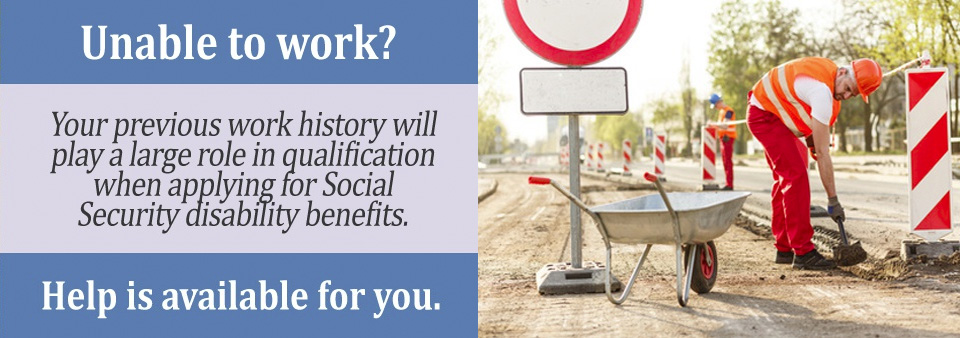Benefits from the Social Security Administration (SSA) remove some of the financial strain from individuals and families when disability strikes. Eligibility depends on various factors though, including previous employment for adults who apply for Social Security Disability Insurance (SSDI). Work history, including the kinds of jobs you’ve traditionally held, can also play a role in how easily you’re able to you’re eligible for disability.
Available Disability Programs and Work History Requirements
Benefits may be available to you through the SSDI and/or Supplemental Security Income (SSI) programs.
- SSI requires no work history at all, because it’s a program for the most financially needy among the disabled population.
- For SSDI however, you must have a fairly recent work history and must additionally have paid Social Security taxes on your income.
Your work history translates to work credits with the SSA, and these credits make you a “covered” or “insured” person for SSDI as well as old age or retirement benefits.

SSDI Benefits, SGA Work, and MVA Qualification
Basic SSDI eligibility requires a disability so severe that you cannot participate in “substantial gainful activity” or SGA. This essentially means you’re unable to earn a living because of your medical condition(s).
You may qualify under one of the SSA’s Blue Book disability listings, which proves you cannot perform SGA work and are therefore entitled to benefits. Not all applicants qualify through the Blue Book though. Some must instead go through a Residual Functional Capacity (RFC) evaluation and be granted benefits under a Medical Vocational Allowance (MVA).
To approve an MVA, the SSA must see:
- you can no longer work in your traditional field of employment
AND
- you can’t succeed in any other field either.
To make this determination, they’ll review your age, education, job qualifications, and employment history, in addition to your medical records. These factors combined must show SGA level work isn’t possible for you. Because of this, older applicants and those with fewer transferable job skills are more likely to achieve benefits through an MVA.
For example, a machine operator has a physical disability that stops her from performing essential job duties in her traditional line of work. As a person with only factory work experience, she couldn’t easily get an office, even if her disability wouldn’t stop her performing sedentary job duties. The SSA may grant an MVA in a case like this because the applicant’s work history shows she can’t find and keep an SGA level job.
Getting Help with Your Disability Claim
No matter your work history, don’t be intimidated by the disability application or eligibility review processes, especially since you don’t have to go through it alone. A friend, family member, or someone else can help you apply. You may additionally seek guidance from disability advocate or hire an attorney to handle your claim.
An attorney can help you make a stronger argument for eligibility. If you must go through an RFC, a disability lawyer’s assistance increases the likelihood of an MVA approval as well. If you’re denied by the SSA, and must therefore appeal the decision, an attorney can increase your chances of winning disability benefits at the appeal hearing too.